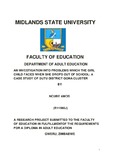Please use this identifier to cite or link to this item:
https://cris.library.msu.ac.zw//handle/11408/4038| Title: | An investigation into problems which the girl child faces when she drops out of school : a case study of Gutu district , Gona cluster | Authors: | Ncube, Amos | Keywords: | girl child drop outs problems |
Issue Date: | 2011 | Publisher: | Midlands State University | Abstract: | The girl child is still facing serious challenges after dropping out of school. To gain an insight on the problem, the study sought to investigate the problems faced by the girl child after dropping out of school. In carrying out the study, the problems faced by the girl child, implications after dropping out, policies in place for retention girls in school, as well as the possible solutions were explored. From the review of literature on school dropout in relation to the girl child, Maslow’s theory of motivation formed the basis of the literature review. Maslow (1943) postulated that human beings have intrinsic needs that need to be fulfilled in order for the person to realize the next need in the hierarchy of needs. If the needs are not met a person might device other means to meet those needs. In the context of this study, the needs of the girl child were assumed not to have been met if she prematurely dropped out of school. The theoretical and conceptual framework outlined the factors that lead to school dropouts and the implications emanating therefrom. Literature on girl child dropout showed that reasons and problems faced by the girls differed internationally, regionally and nationally. The study adopted the qualitative approach that used both the questionnaire and the interview to collect the information from the respondents. This study found out that a cumulative total of 156 children dropped out of school between the period years 2015 – 2016. 0f the 156 children, 93 are girls. The study also showed that girls who drop out of school exhibited low self-esteem. The reasons for dropping out of school were among others, early marriage, teenage pregnancy, poverty, and cultural factors such as ‘Kuzvarira’, betrothal. From the study results, it was shown that school dropout impacted negatively on the girl child’s personal development. The results showed that the education sector is not adequately funded, and national policies on the retention of the girl child are not fully implemented. The other pertinent result was that the limited social safety nets were grossly abused to the detriment of the girl child. | URI: | http://hdl.handle.net/11408/4038 |
| Appears in Collections: | Diploma in Adult Education |
Files in This Item:
| File | Description | Size | Format | |
|---|---|---|---|---|
| Amos - Full Submission Document - 2016 (1).pdf | Full Text | 947.76 kB | Adobe PDF |  View/Open |
Page view(s)
152
checked on Apr 4, 2025
Download(s)
88
checked on Apr 4, 2025
Google ScholarTM
Check
Items in MSUIR are protected by copyright, with all rights reserved, unless otherwise indicated.



